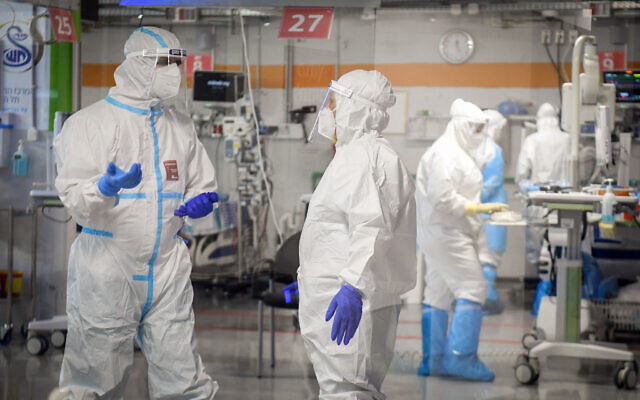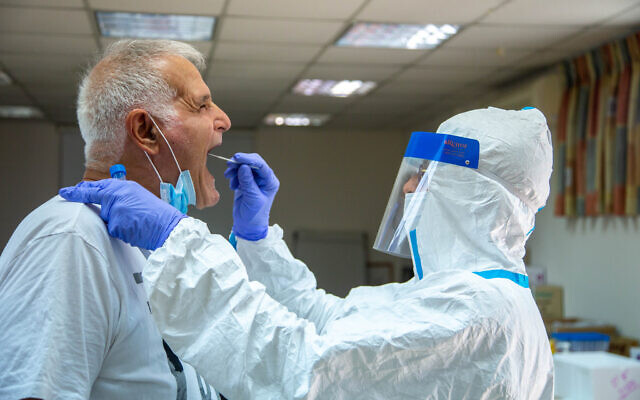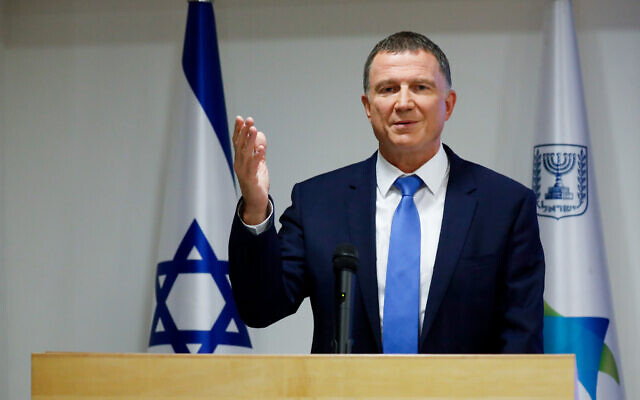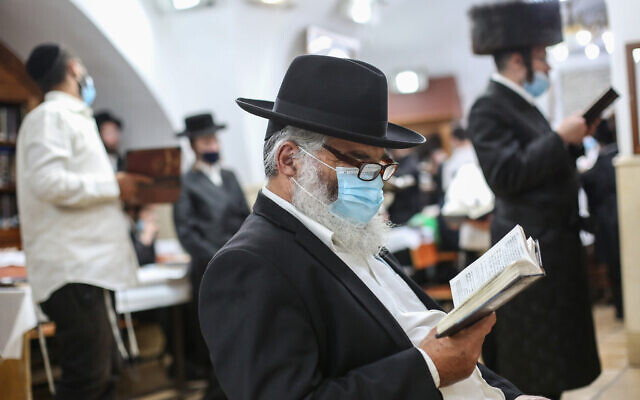Edelstein says new dramatic restrictions needed to flatten the curve; 962 infections confirmed in 24 hours, bringing total to 30,749; 2 deaths announced

The Health Ministry on Monday evening released new figures showing 962 coronavirus infections in the previous 24 hours, as Health Minister Yuli Edelstein said new restrictions approved earlier in the day were aimed at avoiding a national lockdown in the next week or two.
The tally brought the number of total confirmed cases to 30,749. The Health Ministry also announced two new deaths, bringing the toll to 334.
The number of serious cases was down from 90 to 88, but the number of people on ventilators rose to 35, three more than on Monday morning.
Another 88 people were in moderate condition, with the rest suffering mild or no symptoms.
The last few weeks have seen the reversal of many of the gains made in the fight against the coronavirus in recent months. New daily virus cases, which had dropped to low double digits through most of May, have soared to some 1,000 per day, and the number of active cases has reached an all-time high of more than 12,300.
The current increase in weekly infections in Israel is one of the highest in the world, according to a chart published Monday afternoon by the Health Ministry. The chart showed that the increase in new cases relative to the previous week in Israel was almost 12 percent, lower only than Switzerland, Serbia, Australia and the Czech Republic. In many other countries weekly infection rates have even been falling, not rising.
The ministry said 19,420 coronavirus tests were conducted on Sunday, 4.2% of which returned a positive result. It said 14,401 tests were performed on Monday by 7 p.m., with the rate of positive results at 4.8%.

The government earlier Monday passed a raft of restrictions to contain the renewed outbreak, including limiting restaurants and synagogues, reducing the number of passengers on public transportation, hiking fines for not wearing face masks and shutting down event halls, cultural venues, swimming pools, gyms, bars, and nightclubs.
Israel is “a step away from a full lockdown,” Prime Minister Benjamin Netanyahu reportedly told cabinet members during the special meeting. While falling short of shutting down the country like earlier this year, the new measures are a significant step back from May’s reopening of the economy.
The decision stated that within 48 hours, the Finance Ministry must introduce a compensation package for those harmed by the new regulations.
The new restrictions still have to be approved by the Knesset’s coronavirus committee.
Edelstein delivered a prime-time televised statement Monday evening, acknowledging that the new restrictions would harm many sectors, and saying they were necessary in order to flatten the curve and “save Israel’s economy” in the long run.
He touted a decision to compensate businesses hurt by the new measures.

Edelstein said the economy could not recover as long as COVID-19 infections are on the rise. He said the measures were imposed with the hope that a nationwide lockdown would not become necessary in the next week or two.
“Nobody wants that,” he said.
Edelstein said he was “confident” that the restrictions could be eased within a few weeks if the public cooperates and sticks to the social distancing guidelines.
The minister said he would bolster the contact tracing investigations and use a new system to map and stop chains of infections. Edelstein said more employees will be recruited to answer phone calls regarding quarantine, following confusion and claims of long waiting times, for which apologized.

He said a person would soon be appointed to lead Israel’s pandemic response.
The decision by the cabinet, approved earlier in the day, limited restaurants to 20 customers in indoor areas and 30 people in outdoor areas, with tables set at a distance from one another.
All public gatherings will be capped at 20 people, wearing face masks and keeping a distance of two meters.
Organized sporting events can continue, but without an audience. Summer camps and summer schools will not go ahead, except for kindergarten kids and grades 1-4.
Buses will only be allowed to carry 20 passengers at a time, with open windows and no air conditioning.
At least 30% of employees in the public sector are required to work from home.
The cabinet accepted a proposal by Interior Minister Aryeh Deri to keep synagogues open, but with a maximum occupancy of 19 people, down from the current 50. National broadcaster Kan reported that the decision was a compromise between Deri and the rest of the cabinet, which had sought to shutter houses of worship.

Meanwhile, the Knesset’s Constitution, Law and Justice Committee approved the government’s request to raise the fine for failing to wear a face mask in public from NIS 200 to NIS 500 ($145), the Haaretz daily reported.
The Knesset plenum was expected to vote later Monday on the decision regarding the masks.
The closure of yeshivas was also taken off the table in response to pressure. MK Moshe Gafni on Sunday threatened to withdraw his ultra-Orthodox United Torah Judaism Party from the coalition unless yeshivas stayed open.
Monday’s cabinet meeting, with its approval of more restrictive regulations, came after new restrictions reducing gathering sizes at synagogues, bars, clubs and event halls to 50 went into effect Monday morning.
As reported by The Times of Israel
